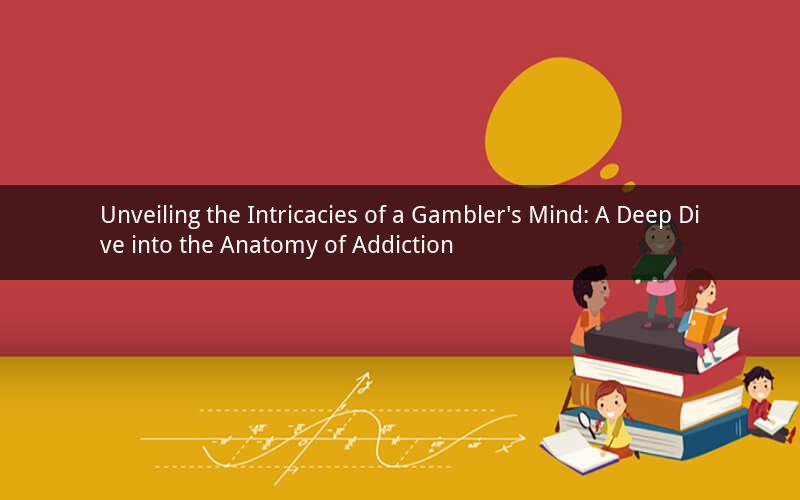
The allure of gambling has captivated countless individuals throughout history, with its promise of fortune and excitement. However, behind the glitz and glamour of casinos and racetracks lies a complex psychological landscape, one that has been extensively studied by psychologists and addiction experts. This article delves into the anatomy of a gambler, exploring the various psychological, emotional, and physiological factors that contribute to the development and progression of gambling addiction.
I. The Psychological Underpinnings of Gambling Addiction
1. The Dopamine Rush: The Brain's Reward System
At the heart of gambling addiction lies the brain's reward system, which is heavily influenced by the neurotransmitter dopamine. When a gambler wins, their brain releases dopamine, creating a sense of euphoria and pleasure. This reinforces the behavior, leading to a desire for more. Over time, the brain becomes desensitized to the natural rewards in life, making the gambler seek out the artificial highs provided by gambling.
2. Cognitive Biases: The Illusion of Control
Gamblers often suffer from cognitive biases, such as the illusion of control. This cognitive bias leads individuals to believe that they can influence outcomes that are, in reality, random. As a result, they continue to gamble, despite the odds being stacked against them. This belief in control is a powerful motivator, as it provides a sense of purpose and accomplishment, even when the gambler is losing.
3. The Role of Personality Traits
Research has shown that certain personality traits, such as impulsivity, sensation-seeking, and neuroticism, are more prevalent in individuals with gambling addiction. These traits make individuals more susceptible to the allure of gambling, as they are more likely to seek out thrilling and risky activities.
II. The Emotional and Social Aspects of Gambling Addiction
1. The Emotional Rollercoaster: The Highs and Lows of Gambling
Gambling addiction often leads to an emotional rollercoaster, with intense highs followed by crashing lows. This rollercoaster creates a cycle of excitement and anxiety, making it difficult for gamblers to break free from their addiction. The emotional turmoil can also lead to other mental health issues, such as depression and anxiety.
2. The Social Consequences: Family, Friends, and Relationships
Gambling addiction can have severe social consequences, affecting relationships with family, friends, and colleagues. The financial strain of gambling can lead to strained finances, causing tension and conflict within relationships. Additionally, the secrecy and deceit often associated with gambling addiction can erode trust and lead to the breakdown of relationships.
III. The Physiological Aspects of Gambling Addiction
1. The Impact on the Brain: Structural and Functional Changes
Research has shown that long-term gambling addiction can lead to structural and functional changes in the brain. These changes may include alterations in the prefrontal cortex, which is responsible for decision-making and impulse control, and the striatum, which is involved in reward processing.
2. The Role of Stress: The Body's Response to Risk and Reward
The body's stress response plays a significant role in gambling addiction. When a gambler experiences stress or anxiety, their body releases cortisol, a stress hormone. This stress response can exacerbate the urge to gamble, as it creates a sense of relief and excitement.
IV. Treatment and Recovery
1. The Importance of Professional Help
For individuals struggling with gambling addiction, seeking professional help is crucial. Therapy, counseling, and support groups can provide the tools and resources needed to overcome addiction. Cognitive-behavioral therapy (CBT) is particularly effective, as it helps gamblers identify and change their addictive behaviors.
2. The Road to Recovery: Support and Relapse Prevention
Recovery from gambling addiction is a challenging process that requires ongoing support and relapse prevention strategies. Gamblers must develop healthy coping mechanisms, learn to manage stress, and build a strong support network of friends and family.
Questions and Answers:
1. Q: Can gambling addiction be cured?
A: Yes, gambling addiction can be cured through effective treatment and ongoing support.
2. Q: How does gambling addiction affect the brain?
A: Gambling addiction can lead to structural and functional changes in the brain, particularly in the prefrontal cortex and striatum.
3. Q: Are there any genetic factors that contribute to gambling addiction?
A: Yes, certain genetic factors may make individuals more susceptible to developing gambling addiction.
4. Q: Can gambling addiction be prevented?
A: Yes, education, awareness, and early intervention can help prevent gambling addiction.
5. Q: What are some common signs of gambling addiction?
A: Common signs of gambling addiction include financial strain, secrecy, deceit, and an inability to control gambling behavior.